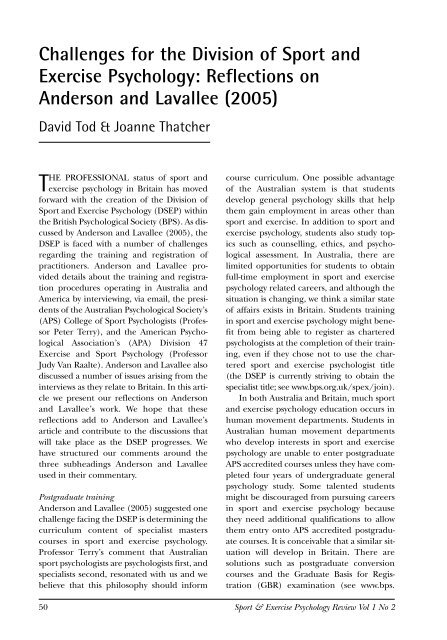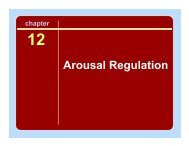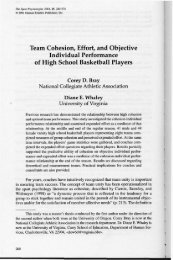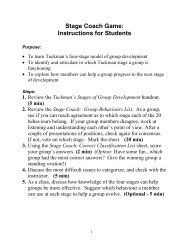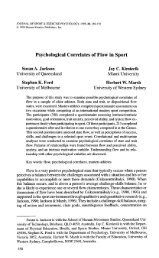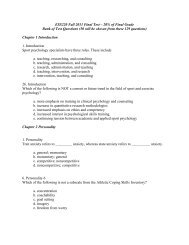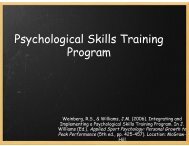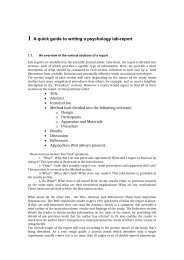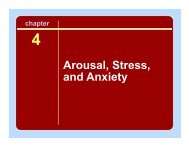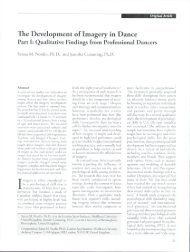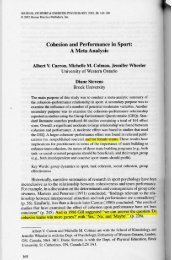Sport and Exercise Psychology Review - Sport Psychology Goes to ...
Sport and Exercise Psychology Review - Sport Psychology Goes to ...
Sport and Exercise Psychology Review - Sport Psychology Goes to ...
You also want an ePaper? Increase the reach of your titles
YUMPU automatically turns print PDFs into web optimized ePapers that Google loves.
Challenges for the Division of <strong>Sport</strong> <strong>and</strong><br />
<strong>Exercise</strong> <strong>Psychology</strong>: Reflections on<br />
Anderson <strong>and</strong> Lavallee (2005)<br />
David Tod & Joanne Thatcher<br />
THE PROFESSIONAL status of sport <strong>and</strong><br />
exercise psychology in Britain has moved<br />
forward with the creation of the Division of<br />
<strong>Sport</strong> <strong>and</strong> <strong>Exercise</strong> <strong>Psychology</strong> (DSEP) within<br />
the British Psychological Society (BPS). As discussed<br />
by Anderson <strong>and</strong> Lavallee (2005), the<br />
DSEP is faced with a number of challenges<br />
regarding the training <strong>and</strong> registration of<br />
practitioners. Anderson <strong>and</strong> Lavallee provided<br />
details about the training <strong>and</strong> registration<br />
procedures operating in Australia <strong>and</strong><br />
America by interviewing, via email, the presidents<br />
of the Australian Psychological Society’s<br />
(APS) College of <strong>Sport</strong> Psychologists (Professor<br />
Peter Terry), <strong>and</strong> the American Psychological<br />
Association’s (APA) Division 47<br />
<strong>Exercise</strong> <strong>and</strong> <strong>Sport</strong> <strong>Psychology</strong> (Professor<br />
Judy Van Raalte). Anderson <strong>and</strong> Lavallee also<br />
discussed a number of issues arising from the<br />
interviews as they relate <strong>to</strong> Britain. In this article<br />
we present our reflections on Anderson<br />
<strong>and</strong> Lavallee’s work. We hope that these<br />
reflections add <strong>to</strong> Anderson <strong>and</strong> Lavallee’s<br />
article <strong>and</strong> contribute <strong>to</strong> the discussions that<br />
will take place as the DSEP progresses. We<br />
have structured our comments around the<br />
three subheadings Anderson <strong>and</strong> Lavallee<br />
used in their commentary.<br />
Postgraduate training<br />
Anderson <strong>and</strong> Lavallee (2005) suggested one<br />
challenge facing the DSEP is determining the<br />
curriculum content of specialist masters<br />
courses in sport <strong>and</strong> exercise psychology.<br />
Professor Terry’s comment that Australian<br />
sport psychologists are psychologists first, <strong>and</strong><br />
specialists second, resonated with us <strong>and</strong> we<br />
believe that this philosophy should inform<br />
course curriculum. One possible advantage<br />
of the Australian system is that students<br />
develop general psychology skills that help<br />
them gain employment in areas other than<br />
sport <strong>and</strong> exercise. In addition <strong>to</strong> sport <strong>and</strong><br />
exercise psychology, students also study <strong>to</strong>pics<br />
such as counselling, ethics, <strong>and</strong> psychological<br />
assessment. In Australia, there are<br />
limited opportunities for students <strong>to</strong> obtain<br />
full-time employment in sport <strong>and</strong> exercise<br />
psychology related careers, <strong>and</strong> although the<br />
situation is changing, we think a similar state<br />
of affairs exists in Britain. Students training<br />
in sport <strong>and</strong> exercise psychology might benefit<br />
from being able <strong>to</strong> register as chartered<br />
psychologists at the completion of their training,<br />
even if they chose not <strong>to</strong> use the chartered<br />
sport <strong>and</strong> exercise psychologist title<br />
(the DSEP is currently striving <strong>to</strong> obtain the<br />
specialist title; see www.bps.org.uk/spex/join).<br />
In both Australia <strong>and</strong> Britain, much sport<br />
<strong>and</strong> exercise psychology education occurs in<br />
human movement departments. Students in<br />
Australian human movement departments<br />
who develop interests in sport <strong>and</strong> exercise<br />
psychology are unable <strong>to</strong> enter postgraduate<br />
APS accredited courses unless they have completed<br />
four years of undergraduate general<br />
psychology study. Some talented students<br />
might be discouraged from pursuing careers<br />
in sport <strong>and</strong> exercise psychology because<br />
they need additional qualifications <strong>to</strong> allow<br />
them entry on<strong>to</strong> APS accredited postgraduate<br />
courses. It is conceivable that a similar situation<br />
will develop in Britain. There are<br />
solutions such as postgraduate conversion<br />
courses <strong>and</strong> the Graduate Basis for Registration<br />
(GBR) examination (see www.bps.<br />
50 <strong>Sport</strong> & <strong>Exercise</strong> <strong>Psychology</strong> <strong>Review</strong> Vol 1 No 2


